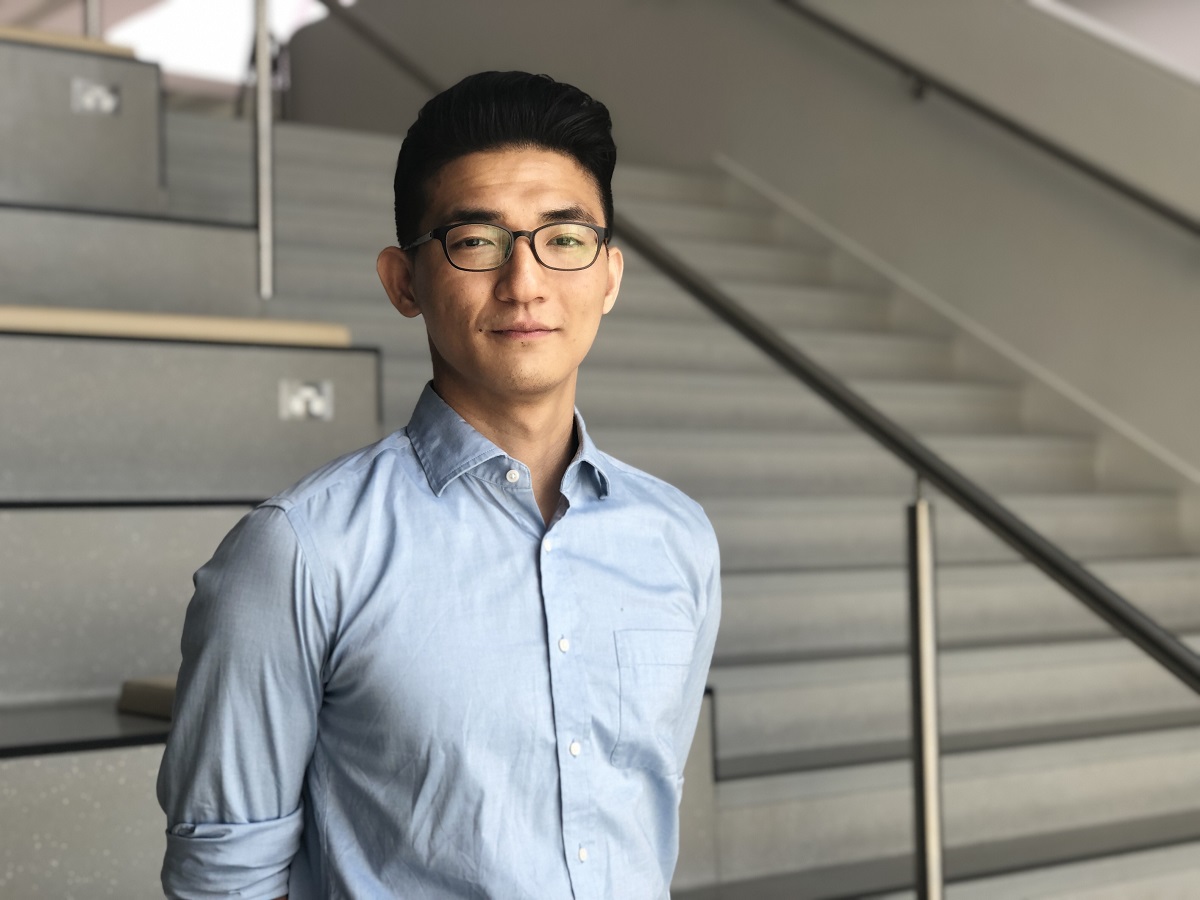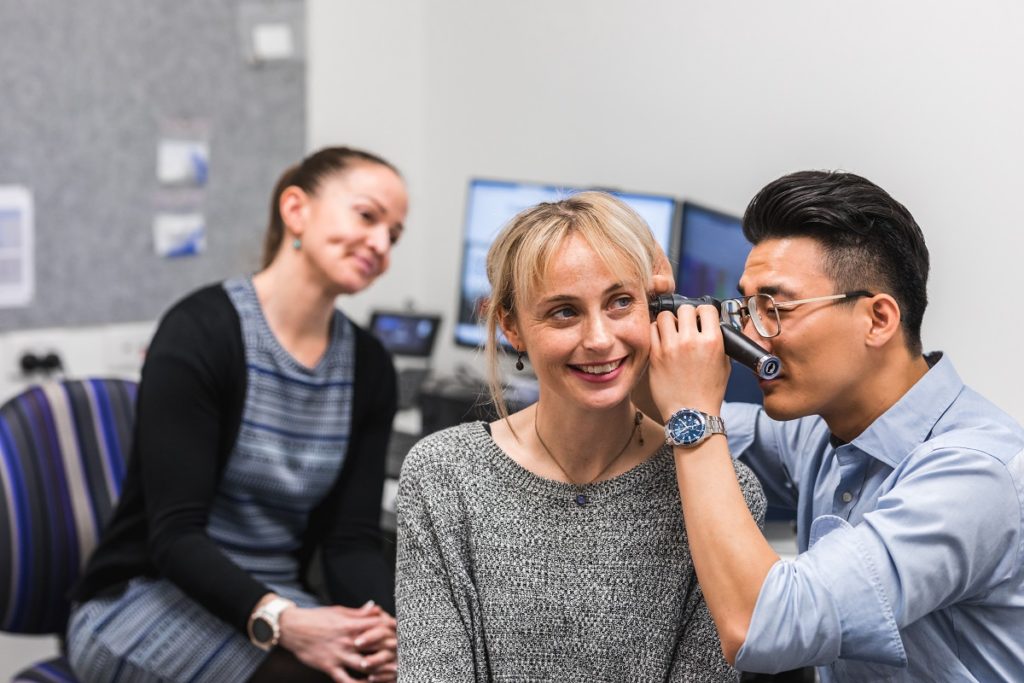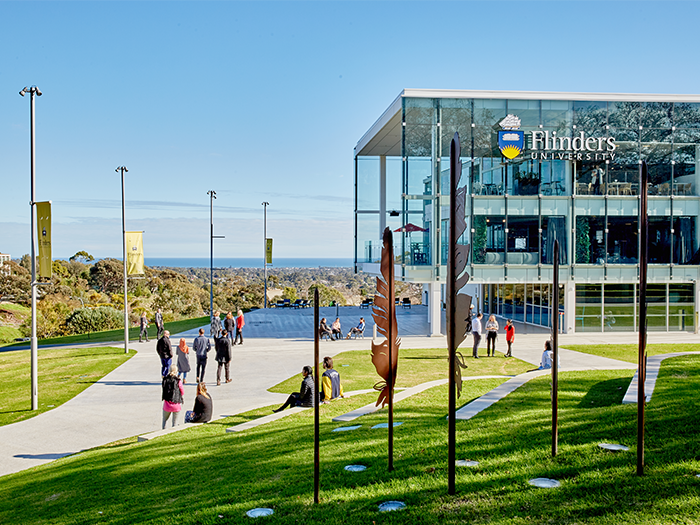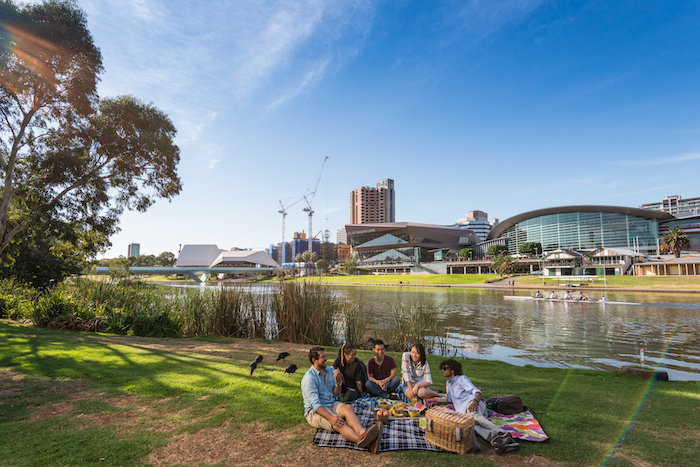
Taiwanese Master of Audiology graduate, Lacey Mengshu Wu, knew his passions involved connecting with people and feeling like he was making a difference to their lives. It’s what led him to pursue a career in audiology and enrol in the master’s course, the only audiology course in Australia, and among few in the world, that uses problem-based learning.
“I am always excited and enthusiastic about connecting with people. Initially, I was looking for a course that can combine biology and the connections between people. I found different sorts of therapists such as physiotherapists and occupation therapists. However, audiology jumped into my eyes, and I decided to enrol in the course. I think it is fascinating to study something that is not so well-known. And as time went by, I learned more things and it interested me much more!”
A high-demand profession with a projected growth rate of 34.7% (audiologists & speech pathologists) according to the National Skills Commission, 2021 Employment Projections for the five years to 2026, audiology involves evaluating, diagnosing, treating and or managing auditory disorders to improve to improve the quality of life of those experiencing conditions such as tinnitus or hearing loss.
For Lacey, this is what makes being an audiologist an enriching and worthwhile career choice.
“The best thing about being an audiologist is that we can solve people’s problems and improve their life qualities. It is such a fulfilment to be trusted.”

Problem-based Learning at Flinders
The Audiology program at Flinders is focused on innovative learning experiences including problem-based learning tutorials, clinical skills classes and clinical placements in Australian centres, hospitals and private clinics, allowing students like Lacey to put theory into practice.
“During the course, we had a half-day or full-day placement each week. It provided us a good overview about the future working environment and the true fact of being audiologists. Things are different from textbooks to practices. We also had chances to administer tests in the placements.”
“We had lectures with Australian Sign language (AUSLAN) users, ENT doctors, clinical audiologists, and other related professions. I appreciated these lectures because we know there are still lots of people suffering from hearing problems and we still need to make much more efforts.”
Throughout the Masters program, students also undertake learning in Flinders’ state-of-the-art facilities at Health2Go – a purpose built service providing students the opportunity to work with clients alongside professional clinicians to gain real-life experience in a modern multidisciplinary environment.
“Flinders has a good reputation of graduates. Audiologists who graduated from Flinders are around Australia and they are doing a good job. In the second year of the course, we had a five-week placement in each semester. The goal of it was to help us practice more. And based on what I have seen, it does help. I am looking forward to helping people with good skills and ethics in any place in Australia in the future.”

Supportive and vibrant, on-campus experience
Lacey says there are three main elements he loved most about studying at Flinders: the student hub, the gym, and the library.
“The student hub is just gorgeous! Whoever designed this must be a genius! It provides students in Flinders a good place to relax, hold interesting activities and study. Also, the view to the ocean is just speechless.”
The AUD $63 million Student Hub and Plaza at Flinders Bedford Park campus is a beloved place among many students, incorporating study spaces, retail stores, cafes, and a bar all with a stunning view of the Adelaide coastline, and surrounded by gum trees, walking trails and koalas.
The university is also currently developing a range of modern facilities, with work underway on a vibrant cultural and creative hub for students, staff and the community, Flinders Village. The first building is already taking shape – the flagship Health and Medical Research Building which will become a focal point for research innovation, all with a seamless connection via the new Flinders Railway Line to the heart of the Adelaide CBD in just 22 minutes.
Lacey’s second favourite thing about studying at Flinders is the on-campus gym, Flinders University Sport & Fitness. He attributes this to helping him stay focused throughout his studies as he was easily able to go in between lectures and tutorials.
“The gym on campus was one my favourites. Being a student is not just about learning new things but to have a balance life. The membership fee is low compared to other gyms. Although it is a bit small but what more can you ask for, if it is only 10 minute-walk from the Flinders Medical Centre. I could go to gym just when the lectures end.”
And lastly, Lacey is a big advocate of the Central library at Bedford Park and the Gus Fraenkel Medical library within the Flinders Medical Centre, which allowed him to successfully complete his studies during his 2-year master’s degree.
“The libraries amaze me as well, both central and medical. For us, we needed to read lots of journals and papers. And it is always a torture when you see the article you desired is not accessible. But the library system made it so much easier. Regarding the environments, I have been to both, and they are just so comfy. The computers have good hardware, so they are not slow. You can finish your job smoothly without any problems.”

Why study in Adelaide, South Australia
When Lacey was initially searching for a university to undertake his masters, he had never heard of Adelaide. However, the more he researched the more he realised it why it was the ideal location for him to study in Australia.
Named the world’s third most liveable city and Australia’s most liveable city in 2021 according to The Economist Intelligence Unit Global Liveability Index, it’s no surprise why Lacey quickly fell in love with calling Adelaide home.
“Before I searched the course, I had never heard about Adelaide, frankly. Please forgive me! However, the more I searched of Adelaide, the more I love the city! How fabulous it is to have such a long coastline with excellent beaches. And all it takes is just a few minutes’ drive from the city!”
“It is always a big problem to try to get used to new environment. However, I realised people in Adelaide are so nice, especially classmates and professors in Master of Audiology!”
A key differentiator for Lacey that attracted him to enrol at Flinders University was the smaller cohort.
“The good thing (of having a smaller cohort) is you can actually have a closer relationship between professors and students. It is always fun to be remembered by lecturers, but not because they will ask you questions in the lectures!”
The smaller cohort teaching ensures a personal approach to learning, and the relationships built between students and lecturers provide a highly supportive and long-lasting connection.
“Studying in Flinders is by far the best choice I made. The university has a good plan to assist international students in all aspects. They do care about your life in university, and you can feel it.”

